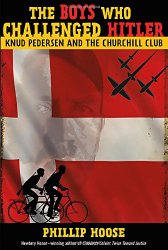
 The Boys Who Challenged Hitler
The Boys Who Challenged HitlerKnud Pedersen and the Churchill Club
Farrar Straus Giroux, New York, 2015. 198 pages.
Starred Review
This year because of schedule conflicts, I'm not attending Capitol Choices (a local group that chooses the 100 best books of the year for children and youth), and I'd promised myself this year I'll just read books I want to read, not books I feel I ought to read. So I thought I wouldn't read much children's nonfiction. This book came in, and I thought I'd just check it back in, unread. But I started dipping into it, and found I couldn't stop.
The story is of a group of Danish teens who didn't like that their government had handed Denmark over to Hitler. They formed their own resistance band before any other organized resistance. They went to prison for it -- and their case galvanized other Danes to act.
Phillip Hoose spoke at length with Knud Pedersen in 2012, working on this book with him before he died in 2014. How wonderful that this information was captured. Much of the book gives Knud's voice and perspective.
Here's a summary from the author in the Introduction, which explains why this important story had to be told. He was visiting the Museum of Danish Resistance in Copenhagen.
Then I came upon a special little exhibit entitled "The Churchill Club." With photos, letters, cartoons, and weapons such as grenades and pistols, the exhibit told the story of a few Danish teens, schoolboys from a northern city, who got the resistance started. Mortified that Danish authorities had given up to the Germans without fighting back, these boys had waged a war of their own.
Most were ninth-graders at a school in Aalborg, in the northern part of Denmark called Jutland. Between their first meeting in December 1941 and their arrest in May 1942, the Churchill Club struck more than two dozen times, racing through the streets on bicycles in well-coordinated hits. Acts of vandalism quickly escalated to arson and major destruction of German property. The boys stole and cached German rifles, grenades, pistols, and ammunition -- even a machine gun. Using explosives stolen from the school chemistry lab, they scorched a German railroad car filled with airplane wings. They carried out most of their actions in broad daylight, as they all had family curfews.
This book tells the details of their story, a fascinating one about teens deciding to act for what they believed to be right, at the risk of their own lives.
The book is engagingly written, with plenty of photographs and sidebars to break up the text. It's targeted toward people the same age as these daring young men were at the time of their resistance.

